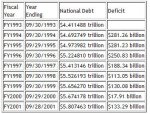:mrgreen: Visbek: If the President were to be elected by popular vote directly we would have had a President Al Gore instead of a selected President George W. Bush. Hopefully that would have meant that President Barack Obama wouldn't have had a 13 trillion debt handed to him on a lead platter! President Clinton left office with zero debt, and they were predicting a 4 trillion dollar surplus within 8 years. A President Gore would have tried his best to make that happen. Why do we get these Republican Presidents who cut taxes (in fairness to Bush, he cut MY taxes too, and I'm by no means rich), and then go ahead and spend like a drunken sailor. When you cut taxes you're supposed to cut spending as well (Duhh!!!) until the extra money the people have to spend comes back to the Government in the form of Federal taxes. Reagan was guilty of this also. tks, chuck
The part in
maroon is utter nonsense, worse that the other nonsense, and actually an enormous lie promulgated by the Clinton Administration, the Democratic party and the Press.
Clinton had no "zero debt", not even in one year. Clinton didn't even have a neutral deficit. And he certainty didn't pass Bush any sort of accumulated surplus!
Various articles on the Internet indicated that Clinton not only balanced the budget, but had a surplus. Generally this argument to was used to highlight the fiscal irresponsibility of the Bush administration. The claims of Clinton's surplus(es) generally as promulgated by
CNN and others, is that Clinton had a surplus of $69 billion in FY 1998, $123 billion in FY1999 and $230 billion in FY2000 . In that same link, Clinton claimed that the national debt had been reduced by $360 billion in the last three years, presumably FY1998, FY1999, and FY2000--though, conspicuously, $360 billion is not the sum of the alleged surpluses of the three years in question ($69B + $123B + $230B = $422B, not $360B)!
Below is the deficit and debt during the Clinton Administration, as reported by the U.S. Treasury:

]
As can be seen, at no time did Clinton have even an budget surplus in even one year, much less pass Bush an overall surplus, as some have reported. F
How is this Clinton Surplus even claimed? It is essentially an accounting lie, with the reported surplus being attributed to Social Security (making it also another form of lie), and resulting from the DOT COM bubble, involving companies with no real assets, and no real production relying on the increase in supposed production with the growth of the Internet, and this being seen in the form of profits and Social Security payments, as if it were suddenly a far more robust economy.
The surplus deception is clearly evident by examining the national debt itself over Clinton's presidency. While the government's big spenders (Democrats) are boasting about surpluses, as if they were real and spendable, the national debt is rising year after year, while increasing the future debt obligation..
In 1998, the first year of the alleged surplus, debt rose from $5.413 trillion to $5.526 trillion, due to a deficit of $112.9 billion. When the federal government spends Social Security money and other trust funds, these constitute both present and obligations, and the government accumulates further debt
.
This ideological cover-up of Clinton and by the Democrats, was seen again under Bush, when the Pelosi Congress took over in November '06, and then instituted their first Pelosi Democrat Congress budget in the 2007 FY.
While Bush and the Republicans had been gradually getting the federal deficit under control after 9/11, approaching a defiit-neutral budget, this trend was abruptly and enormous.y reversed under the Pelosi Congress, skyroocketing the budget deficit.

The Republicans are not angelic when it comes to spending, but it is a thorough dishonesty to try and claim they are anything comparable to the Democrats, much less that there is any hint of fiscal responsibility from them. Bush wasn't spending like a drunken sailor, but the American economy cut back after 9/11, causing decreased revenues. Now they Democrats, they're the drunken sailors, and pilfering from the Social Security while they send the ship of state to Davy Jone's locker.
Oh, its another gross falsehood to say that Bush was "selected" too. The Court didn't select Bush, but rather prevented the redefining "a vote", but only in Democratic districts, only to increase Gore's results. It's called "selective sampling" and is a direct corruption of the vote, and election.
Furthermore, a lower tax rate (your cut in taxes) allows more money to remain in the economy, with a bigger money multiplier, and also allows the "PIE" to increase, while the government is taking a smaller percentage, but getting a bigger piece overall. This is another fact of reality that Democrats don't get. Government spending does not increase the real economy. Reagan was NOT guilty of this either! Reagan's tax cutes greatly increased revenues, but these increased revenues did not cover the increased spending from Congress.
I should have colored your entire post Maroon, since it is all currupt partisan falsehood, but then I wouldn't have anything to single out.


